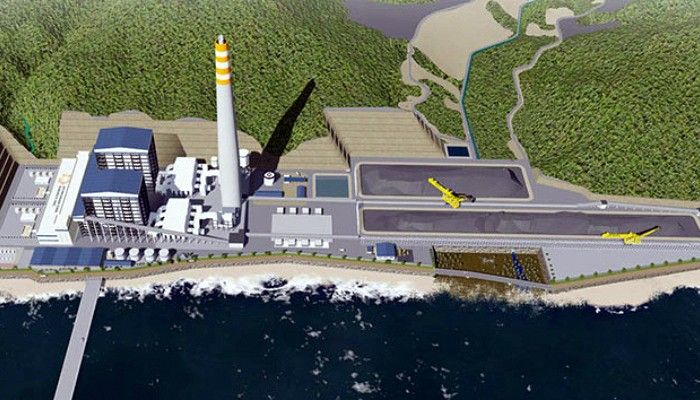DENR sued at Ombudsman for delayed response over Atimonan coal plant

MANILA, Philippines — A complaint was filed on Tuesday before the Office of the Ombudsman against the Department of Environment and Natural Resources due to its "snail-paced" response to a request for documents on the Atimonan coal-fired power plant project, or CFPP.
Lawyer Avril De Torres said the Center for Energy, Ecology and Development (CEED) in July asked for copies of all the records related to a 2015 petition filed by residents of Atimonan, Quezon calling to cancel the Environmental Compliance Certificate issued to Atimonan One Energy's CFPP project.
Atimonan One Energy is a wholly-owned subsidiary of Meralco.
"It took the DENR two months to issue a simple response denying the request as the documents should be specifically listed," De Torres, also Research, Policy, and Law Program Head of CEED, said in a Thursday release.
In response to the rejected request, a representative from CEED personally asked for the records from the department's Environmental Management Bureau on November 5 with complete details as required by the office.
Upon follow-up on November 8, the documents were still not provided since “the request has yet to be resolved by the appropriate offices handling the matter.”A range of environmental and economic sustainability issues are posed by the CFPP project, according to an infographic on the project prepared by CEED and the Power for People Coalition.
Lawyer Janice Regoso, an environmental management official of the DENR, told Philstar.com on November 15 that the office declined to comment on the complaint. They will, however, respond to CEED's November 5 request.
Regoso said the the DENR's Environmental Management Bureau will not yet be able to release the documents sought by CEED since the request is still "under evaluation."
Youth speak out against coal-fired power plant construction in Atimonan, Quezon. #GetUpAnd #quitcoal pic.twitter.com/0OJHnJJQtA
— Greenpeace Philippines (@gpph) May 30, 2015
Environmental threats include damaging biodiversity since the site of the coal plant is near Lamon Bay, a protected area. Air pollution and climate change are also attributed in general to coal-based power production.
Global 3000 EarlyBird Watch
— Doing Things Differently (@dtdchange) November 19, 2018
Philippines:
Solar power instead of coalhttps://t.co/d9hcHePFgB #keepitintheground #RenewableEnergy
Atimonan, a coastal town in the Philippines, is resisting the construction of new power plants pic.twitter.com/M0yWrrCCgK
Red tape
“November 12 marks a full week since we asked for the records, and the DENR continues to dally—a clear violation of the Anti-Red Tape Act of 2007 as amended by the Ease of Doing Business Act and Efficient Delivery of Government Services of 2018, which says that favorable action should have been made within 3 days from receipt of request,” De Torres said.
The Anti-Red Tape Act of 2007, as amended by the Ease of Doing Business and Efficient Government Service Delivery Act of 2018, states that officers must act on all applications and requests no longer than three working days for simple transactions and seven working days in the case of complex transactions.
"The receiving officer or employee shall immediately inform the applicant or requesting party of any deficiency in the accompanying requirements, which shall be limited to those enumerated in the Citizen's Charter," Section 9 of amended Anti-Red Tape Act reads. According to the complaint filed by CEED, it took the DENR-EMB’s Central Office more than 53 days to tell CEED to specify the documents it requested on July 18.
Fast-tracking amid delayed response
As the DENR's response remains pending, the CFPP project has already started construction amid protests from locals and environmental groups.
“Already, land is being cleared, roads are being constructed, and ecosystems are being disturbed in the proposed project site in Atimonan. With this, it is questionable as to whose interests the DENR is really protecting,” De Torres said.
“This appalling lack of urgency by which DENR responds to inquiries; the obscurity of processes needed to gain access to information regarding the environmental impacts of energy projects being developed—these make it apparent that it sure isn’t the public’s.”
CEED Executive Director Gerry Arances said the DENR's slow response is ironically rushing the degradation of the environment it is tasked to conserve since an executive order under effect is already fast-tracking the contested CFPP project.
Executive Order 30 created the Energy Investment Coordinating Council to streamline the regulatory procedures affecting energy projects.
It defines Energy Projects of National Significance as "major energy projects for power generation, transmission and/or ancillary services including those required to maintain grid stability and security, identified and endorsed by the [Department of Energy]."
Energy projects need to possess any of the following attributes:
- Significant capital investment of at least P3.5 billion
- Significant contribution to the country's economic development
- Significant consequential economic impact
- Significant potential contribution to the country’s balance of payments
- Significant impact on the environment
- Complex technical processes and engineering designs
- Significant infrastructure requirements.
“By streamlining the processing of requirements necessary for projects deemed as EPNS, many important measures set in place to protect the environment and host communities are being circumvented. This makes EO 30 undoubtedly unconstitutional,” Arances said.
The CEED and the P4P Coalition asked for the revocation of EO 30 through a case filed at the Supreme Court.
Arances told Philstar.com on Friday that a mere response from DENR's arm would not suffice if they are not provided the requested documents.
"The only recourse for us was to file an Ombudsman case," Arances said.
"These are public documents in the first place...Napaka-simple lang ng kasong ito pero pinapahirapan lang ng DENR."
- Latest
- Trending

































